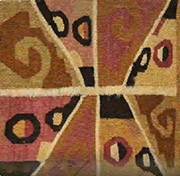Center, Textile Research

IX Jornadas Internacionales de Textiles Precolombinos y Amerindianos / 9th International Conference on PreColumbian and Amerindian Textiles, Museo delle Culture, Milan, 2022
Date of this Version
2024
Document Type
Article
Citation
Published in IX Jornadas Internacionales de Textiles Precolombinos y Amerindianos / 9th International Conference on Pre-Columbian and Amerindian Textiles, Museo delle Culture, Milan, 2022. (Lincoln, Nebraska: Zea Books, 2024)
DOI: 10.32873/unl.dc.zea.1638
Abstract
México es un país que cuenta con importantes saberes históricos que han implicado el uso, intercambio y confección de sistemas indumentarios de poderoso valor simbólico y estético relacionado a cosmovisiones indígenas. Este tipo de saberes colectivos guardan una serie de conocimientos tecnológicos, además de complejos repertorios figurativos entre otros. Más allá de su compleja riqueza estética, los textiles tradicionales implican procesos de vida en los que las agentes primordiales han sido las mujeres a lo largo de la historia. En los últimos tres años de manera sistemática en México se han exhibido casos de plagio de elementos textiles que evidencian la falta de mecanismos legales de protección de estas formas de patrimonio, al ser descontextualizados y reproducidos mediante múltiples formas para su venta a nivel nacional e internacional. Es por esto que este texto inicia la reflexión de conceptos tales como apropiación o préstamo cultural y la cercanía que guardan estos términos respecto al plagio o extractivismo epistémico. Asimismo, se presentarán avances de un estudio de caso que muestra los resultados obtenidos respecto a formas posibles de protección de las memorias y los patrimonios textiles, mediante una propuesta metodológica colaborativa e intercultural, situada entre contextos universitarios y colectivas de mujeres indígenas.
Mexico is a country with important historical knowledge that has involved the use, exchange and manufacture of clothing systems of powerful symbolic and aesthetic value related to indigenous cosmovisions. This type of collective knowledge includes a series of technological knowledge, as well as complex figurative repertoires, among others. Beyond their complex aesthetic richness, traditional textiles imply life processes in which women have been the primary agents throughout history. In the last three years, cases of plagiarism of textile elements have been systematically exhibited in Mexico, evidencing the lack of legal mechanisms to protect these forms of heritage, as they are decontextualized and reproduced in multiple ways for sale nationally and internationally. It is for this reason that this text initiates a reflection on concepts such as cultural appropriation or borrowing and the closeness of these terms to plagiarism or epistemic extractivism. It will also present advances of a case study that shows the results obtained regarding possible forms of protection of memories and textile heritages, through a collaborative and intercultural methodological proposal, located between university contexts and indigenous women’s collectives.
Included in
American Material Culture Commons, Art and Materials Conservation Commons, Fiber, Textile, and Weaving Arts Commons, Indigenous Studies Commons, Latin American History Commons, Museum Studies Commons, Native American Studies Commons, Other History of Art, Architecture, and Archaeology Commons, Other Religion Commons


Comments
Copyright © 2024 Claudia Rocha Valverde.